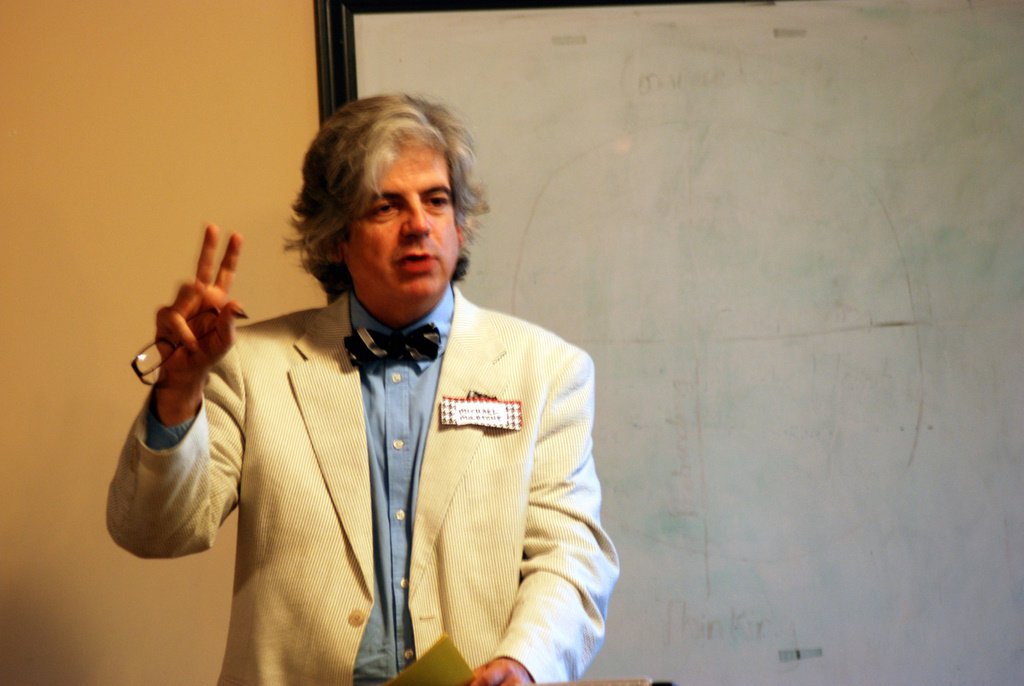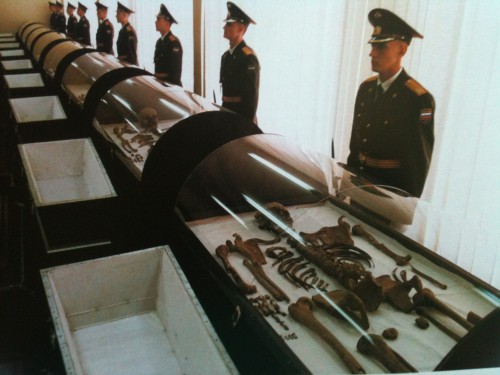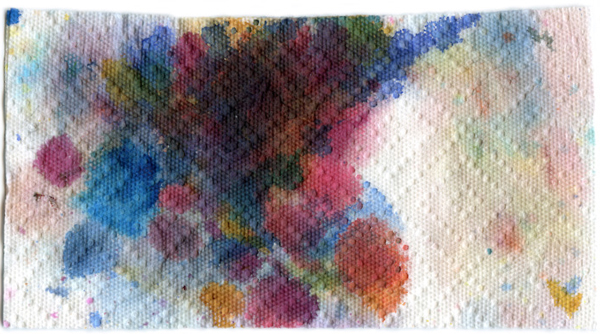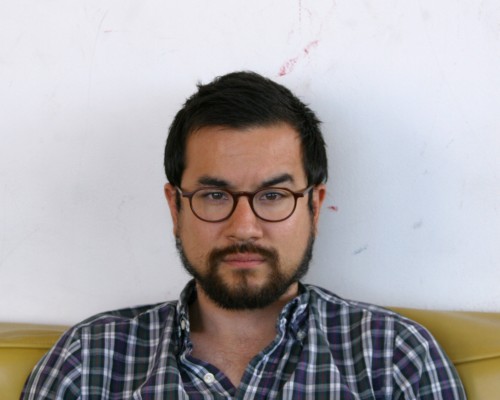Please, please, no more promo emails for your client’s new book where the first line is a question meant to sum up the central conflict. I seriously just got this one: “Dear Blake, What happens when a serial killing cab driver and a suicidal socialite collide?” Bro…
I’m curious about your job and how you negotiate job vs. creativity–or if there’s a difference. Take my survey? I’ll post results/anonymous responses and conclusions when I get enough responses. A Job Worth Doing
“My writing isn’t a career or a craft or a hobby or anything like that. It is more like a tiny annex to my life, a little crawl space in which I occasionally end up by accident in the dark.” — Gary Lutz, interviewed by David Winters @ 3:AM Magazine. Also: Lutz is reading tonight at the Soda Series.
An Interview with Michael Martone

Depending on whom you ask, Michael Martone is either contemporary literature’s most notorious prankster, innovator, or mutineer. In 1988 his AAP membership was briefly revoked after Martone published his first two books—a “prose” collection titled Alive and Dead in Indiana and a “poetry” collection titled The Flatness and Other Landscapes—which, aside from The Flatness and Other Landscapes’ line breaks, were word-for-word identical. His membership to the Alliance of Icelandic Writers was revoked in 1991 after AIW discovered that, while Martone’s registered nom de plume had been “born” in Reykjavík, Martone himself had never even been to Iceland. His AWP membership was revoked in 2007, reinstated in 2008, and revoked again in 2010.
After his first two collections, Martone went on to write Michael Martone, a collection of fictional contributor’s notes originally published among nonfictional contributor’s notes in cooperative journals, The Blue Guide to Indiana, a collection of travel articles reviewing fictional attractions such as the Musée de Tito Jackson (most of which were, again, originally published as nonfiction), a collection of fictional interviews with his mentor Kurt Vonnegut, fictional advertisements in the margins of magazines such as Tin House and Redivider, poems under the names of nonfictional colleagues, and blurbs for nonexistent books.
But his latest book is perhaps the most revealing—Racing in Place is a collection of essays on Martone’s obsession with blimps, basketball, and the Indianapolis 500, symbols for him of “this kind of frenetic motion and also this kind of staticness in the Midwest.” Born in Northport, Michigan, Martone has often been described as a regionalist, and his relationship with the Midwest mirrors his relationship with literature: Martone thinks of the Midwest as a “strange, imaginary place, with no distinct borders or boundaries.”
Martone now lives in Tuscaloosa, where he teaches in the MFA program at the University of Alabama. In spring 2011 Martone was arrested outside of Golyadkin’s Pub in Tuscaloosa for assaulting, allegedly, the writer Thomas Pynchon, allegedly. During Martone’s six-week sentence at Tuscaloosa County Jail, I was approved for a “non-contact visit” for our interview: meaning that Martone and I could meet face-to-face, but separated by a panel of bulletproof glass, talking to each other over yellow telephones. (It’s unclear why Martone wasn’t allowed a “contact visit”—typically an inmate serving time for a misdemeanor, especially one with a sentence as brief as Martone’s, is granted contact visits as a matter of routine, SOP—when I asked Martone about it, he refused to answer my question.) Martone wore an orange jumpsuit, did not wear but instead held a pair of tortoiseshell eyeglasses, and had not shaved since his incarceration. I was allowed one pen and one pad of paper—nothing more.
Upon his release, Martone and his wife left for Frankfurt, Germany, where they will spend what remains of his sabbatical year.
July 14th, 2011 / 1:32 pm
Happy Birthday, Albert Ayler
Had he not committed suicide in 1970—and not died of old age in the last few years—he’d be 75 today. If you don’t own Spirits Rejoice, there is a hole in your record collection.
Book + Beer: Dortmunder and Siberia
Possibly Ian Frazier’s Travels in Siberia is meta, as in many times I felt I was trapped within its 544 pages, or book as Siberia (a land mass that is 1/12th of the earth and 77% of Russia [though it contains only 25% of the population of that country]), a slog, лонг травел, shall we say, though—like the author to his subject—I did return again and again (Frazier labels his emotions about the region as “dread Russia-love.” The man takes 11 trips to Russia for this book!). I felt the attraction, and the dread. Let’s put it this way: I never felt exiled, per say, to the steppes of seemingly blizzardly white pages. But I was often exhausted. I shall return to this exhaustion after I crack open this bottle of beer: TSSST. My thirst and fatigue is one result of Frazier’s technique.

What beer? Great Lakes Brewing Company Dortmunder Gold. First thing, you can’t go blar with any Great Lakes beer. They make glow beer. Period. The Dortmunder Gold has a cool name (sounds sort of like a type of Salvia divinorum or maybe an office award ceremony or possibly an over/under shotgun manufactured in Belgium), a cool pedigree (multiple time world beer champion gold medalist), and a cool alcohol content, at a reasonable 5.8%. It will make your head go whoosh-whoosh, clang.
Technique of Ian Frazier? Let me digress: I’m at this July 4 party and this older gentleman sets down his beer (Coors) and tells us a story about how one day in the 1940’s, as a small kid, he strolled about his aunt’s farm and entered a dark, dusty barn and there was a body hanging from a rope tied to the rafters. Dangling there, a dead man. And so, as a kid, with an odd kid brain, he leaped up and swung back-n-forth on the dead man’s legs, like whippeeeeee! Like it was some game.
What is Experimental Literature? {Recap: Five Questions Vol. 2}
In case you missed any of them, below you’ll find links to each of the writers who participated in the second edition of my series of interviews aimed at expanding our understanding of experimental literature. (Also if you missed it, here is a link to the list of writers who participated in the first edition.)
Again, my thanks to everybody for participating. This has been a really insightful experience for me and hopefully for many of you. In the near future, I plan to do a post that addresses some of what I’ve learned from the series and how it has helped me to rethink my ideas about this nebulous category of “experimental literature.” At the moment, I’m unsure about a third edition. Only time will tell. But for now, I encourage you to visit or revisit the ocean of ideas presented by this impressive group of writers:
Rule of Threes

1. I’m reading Gail Mazur‘s new book of poems, Figures in a Landscape. The final two couplets of the title poem, an ekphrasis of the imagination:
If no one looks at us, do we or don’t we disappear?
The landscape would survive without us.When you’re in it, it’s not landscape
any more than the horizon’s a line you can stand on.
In this book I’m encountering the melancholy of a beach in winter, a poet microscoping her life and then telescoping her life, a poet who’s so careful with every word that sometimes I’m afraid I will break them just by thinking too hard.
2. The Summer 2011 issue of Sixth Finch is up and running. I just enjoyed Leora Fridman’s “Pistons,” which begins, “I tap out my knowledge of neatness on an old machine for / sending pigeons,” and flaps out into laser beam lunacy. The issue, wholly, invokes small town, prairie view summers. Potted plants of madness and bleeding cow heads abound.
3. When you wake up in the morning, do you have a song in your head? Mine is “Today” by the Smashing Pumpkins most days. This morning, though, it was “Proud to Be an American.” This is the morning after reading about TBHQ in our chicken McNuggets and how, according to the St. Pete times today, Tea Party members in Florida are tackling a new issue: manatees. “We cannot elevate nature above people,” explained Edna Mattos, 63, leader of the Citrus County Tea Party Patriots, in an interview. “That’s against the Bible and the Bill of Rights.” God forbid we limit our drunken boating excursions.
Stuff Left Behind

Paper Towel, June 3, 2011, Jeffrey Simmons
I have a small file cabinet under my desk that has in it scraps of paper with notes—on notebook paper, printer paper, index cards, Post-It notes, and even (yeesh) napkins. Early drafts of stories—from a time when I wrote everything long hand first, and then typed them up—are in there. Little bits of research that I printed out, glanced at, and then decided to ignore. Pictures I took out of magazines.
There’s another pile on my bookshelf that’s twice the size of my mid-sized cat.
Why am I keeping it all? I thought about throwing it away, recently, READ MORE >

